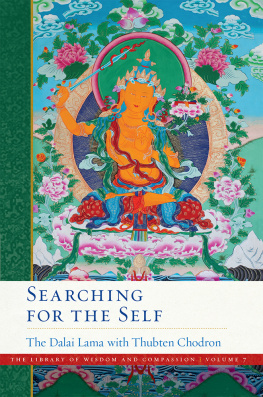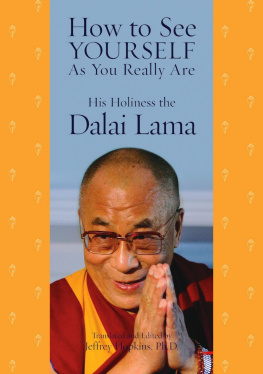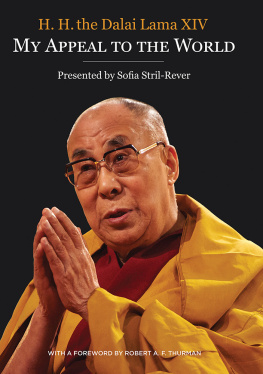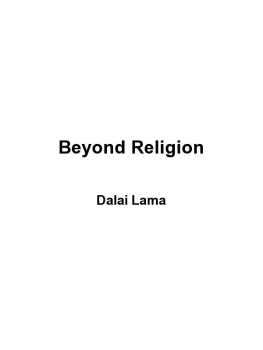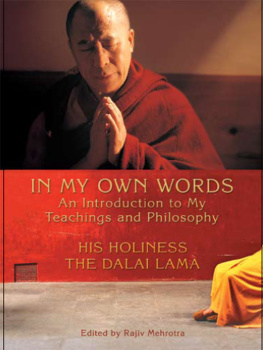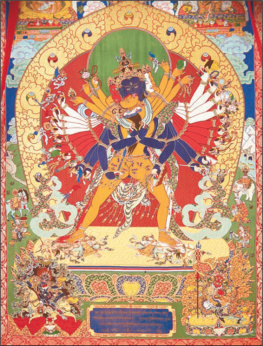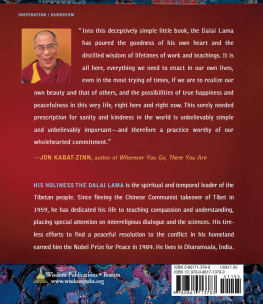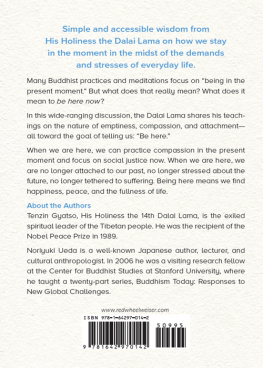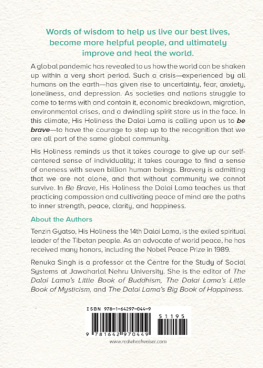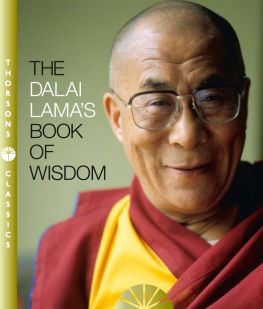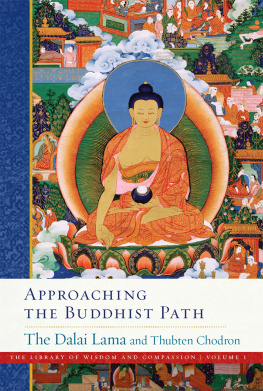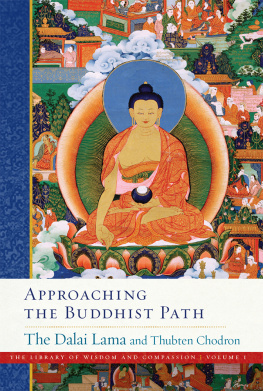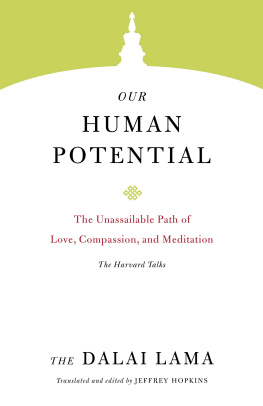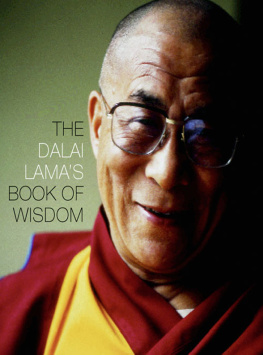Advance Praise for
SEARCHING FOR THE SELF
I am thrilled to see Searching for the Self . All the volumes in the Library of Wisdom and Compassion are a highly cherished treasurethey are profound yet easily accessible. Searching for the Self will help to open your wisdom eye to investigate emptiness. With that understanding, you can fly in freedom without grasping to illusory objects.GESHE LHAKDOR, director, Library of Tibetan Works and Archives, Dharamsala, India
It is refreshing to come across such a clear and in-depth study of the Middle Way teaching of no-self and emptiness as found in the Mahyna and Theravda traditions. This remarkable book opens the door to a wide and profound understanding of those teachings and to the path leading to their realization.AJAHN SUNDARA, author of Walking the World , Seeds of Dhamma , and Pacupanna: The Present Moment
This seventh volume in the Library of Wisdom and Compassion is undoubtedly the masterpiece of H. H. the Dalai Lama and Thubten Chodron. Searching for the Self deals not only with the heart of the Buddhist view on emptiness, which distinguishes it from the great monotheistic religions, it also discusses the approaches of Pli and Chinese Buddhism on the ultimate nature. A brave, impressive, and convincing presentation toward a theory of Buddhist ecumenism, it enables Buddhists worldwide to speak in one voice about important issues that concern all of us today. At the same time, it gives non-Buddhists fresh insight into the world of Buddhist thought and practice.DR. CAROLA ROLOFF (Bhiku Jampa Tsedroen), Professor for Buddhism and Dialogue at the Academy of World Religions of the University of Hamburg
With this book the authors have opened the door to a vast treasure of Buddhist ideas. Based on instruction given by the Dalai Lama to audiences around the world, it speaks directly to issues of the human condition. A valuable compendium of Buddhist philosophy that addresses both simple, grounded, spiritual practice, and the need to comprehend higher profound truths.IAN COGHLAN (Jampa Ignyen), Monash University
THE LIBRARY OF WISDOM AND COMPASSION
The Library of Wisdom and Compassion is a special multivolume series in which His Holiness the Dalai Lama shares the Buddhas teachings on the complete path to full awakening that he himself has practiced his entire life. The topics are arranged especially for people not born in Buddhist cultures and are peppered with the Dalai Lamas unique outlook. Assisted by his long-term disciple, the American nun Thubten Chodron, the Dalai Lama sets the context for practicing the Buddhas teachings in modern times and then unveils the path of wisdom and compassion that leads to a meaningful life, a sense of personal fulfillment, and full awakening. This series is an important bridge from introductory to profound topics for those seeking an in-depth explanation from a contemporary perspective.
Volumes:
Approaching the Buddhist Path
The Foundation of Buddhist Practice
Sasra, Nirva, and Buddha Nature
Following in the Buddhas Footsteps
In Praise of Great Compassion
Courageous Compassion
Searching for the Self
More volumes to come!

Wisdom Publications
199 Elm Street
Somerville, MA 02144 USA
wisdomexperience.org
2022 Dalai Lama and Thubten Chodron
All rights reserved.
No part of this book may be reproduced in any form or by any means, electronic or mechanical, including photography, recording, or by any information storage and retrieval system or technologies now known or later developed, without permission in writing from the publisher.
Library of Congress Cataloging-in-Publication Data
Names: Bstan-dzin-rgya-mtsho, Dalai Lama XIV, 1935 author. | Thubten Chodron, 1950 author.
Title: Searching for the self / Bhiku Tenzin Gyatso and Bhikun Thubten Chodron.
Description: First. | Somerville: Wisdom Publications, 2022. | Series: The library of wisdom and compassion; 7 | Includes bibliographical references and index.
Identifiers: LCCN 2021030593 (print) | LCCN 2021030594 (ebook) | ISBN 9781614297956 (hardcover) | ISBN 9781614298205 (ebook)
Subjects: LCSH: Sunyata. | BuddhismDoctrines.
Classification: LCC BQ4275 .B78 2022 (print) | LCC BQ4275 (ebook) | DDC 294.3/42dc23
LC record available at https://lccn.loc.gov/2021030593
LC ebook record available at https://lccn.loc.gov/2021030594
ISBN 978-1-61429-795-6 ebook ISBN 978-1-61429-820-5
26 25 24 23 22
5 4 3 2 1
Photo credits: cover, courtesy of His Holiness the Dalai Lama; pp. vi, xii, 196, nandajoti Bhikkhu / PhotoDharma.net; p. 4, Tibetan Nuns Project | TNP.org; p. 160, Leila Mills; pp. 228, 374, Olivier Adam; p. 320, Gen Heywood Photography
Cover and interior design by Gopa & Ted 2.
Interior typeset by PerfecType, Nashville, TN.
Publishers Acknowledgment
The publisher gratefully acknowledges the generous help of the Hershey Foundation in sponsoring the production of this book.
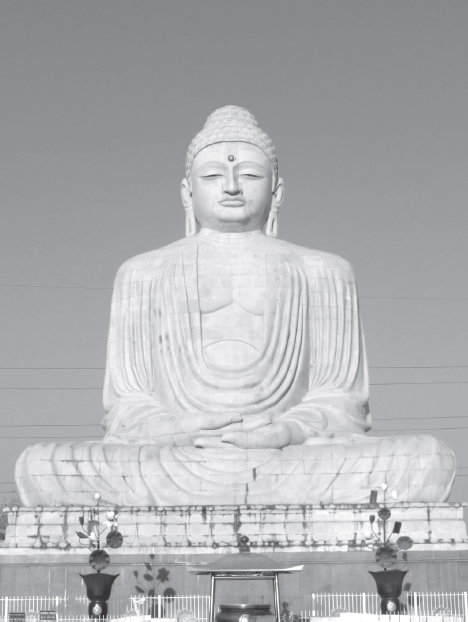
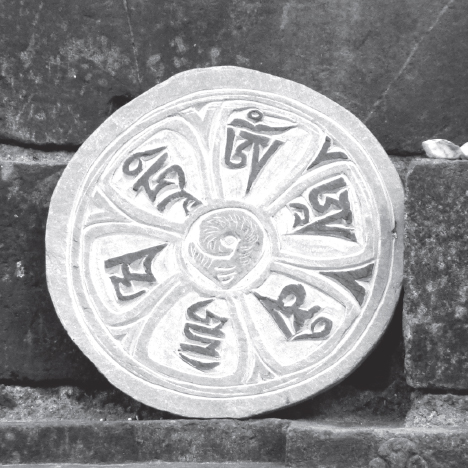
Preface
M ANY OF THE PRACTICES we do on the path to awakening are to prepare us to study, contemplate, meditate on, and realize the nature of reality, for this is the realization that has the power to cut our defilements from their root. So in the Library of Wisdom and Compassion , we now arrive at this topic. Although His Holiness has sprinkled his discussion of emptinessthe absence of inherent existencethroughout previous volumes, in this and the next two volumes he delves deeply into this topic, presenting it from a variety of approaches. This first of the three volumes on emptiness, Searching for the Self , focuses on identifying our erroneous views and directing us to the actual mode of existence of all persons and phenomena. Doing this will challenge some of our deepest-held beliefssome false ways of viewing ourselves and the world that are so habitual that we dont even notice them. Get ready to be challenged and intrigued!
How This Book Originated
The Library of Wisdom and Compassion has been many years in the making. As relayed in the prefaces of previous volumes, the idea for such a series began in the early 1990s when I requested His Holiness the Dalai Lama to write a short text that Tibetan lamas could use when teaching the Buddhadharma to Westerners and other non-Tibetans. His Holiness responded that we should write something longer first, gave me a transcript of one of his teachings, and sent me off to work.
In interviews with him over the ensuing years, the focus and scope of the series became clearer. The following is some of His Holiness advice:
Our main aim is to help practitioners of the Pli and Sanskrit traditions have a better understanding of each others teachings and practice; a better understanding between the two traditions will bring closer contact, which will not only benefit individual practitioners but also enable the Buddhadharma to exist longer. In addition, it will enable Buddhist leaders from all traditions to speak in one voice about important issues in the world, such as climate change.
Except for minor differences, the Vinaya practice in all traditions is basically the same; the Vinaya and prtimoka are emphasized in both the Fundamental Vehicle and the Mahyna. The thirty-seven harmonies with awakening are also held in common. After reading this book, Theravda practitioners will have clearer understanding that Mahyna practitioners also engage in these practices and Mahyna practitioners will know that Theravda practitioners meditate on immeasurable love and compassion.

